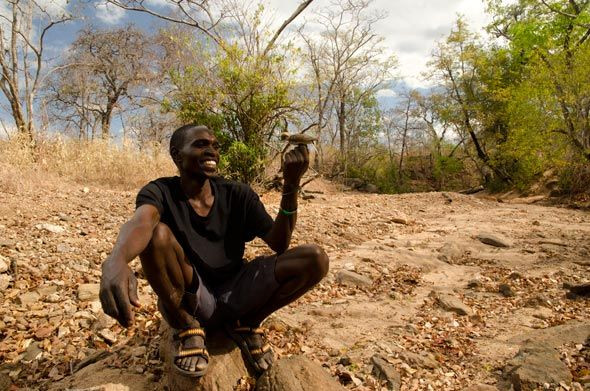Wild Honeyguide Birds Help Humans Find Honey And Wax

Humans have long domesticated various animals for many purposes but it is quite rare to find a wild animal species that actively cooperates with humans for mutual benefit. A new study, published in the journal Science on Friday, found that free-living honeyguide birds in Mozambique regularly help humans locate nests of bees for collecting honey.
The study shows “experimentally that a specialized vocal sound made by Mozambican honey-hunters seeking bees’ nests elicits elevated cooperative behavior from honeyguides,” behavior it calls “a rare example of a mutualistic foraging partnership between humans and free-living wild animals.” According to the paper, titled “Reciprocal signaling in honeyguide-human mutualism,” the sound used by the honey-hunters “increased the probability of being guided by a honeyguide from about 33 to 66 percent and the overall probability of thus finding a bees’ nest from 17 to 54 percent, as compared with other animal or human sounds of similar amplitude.”
Cooperating with humans is beneficial for the bird too, which is found widely in sub-Saharan Africa. They consume beeswax but “bees’ nests are often hidden in inaccessible crevices high up in trees – and honeybees sting ferociously. Therefore the honeyguide waits while an expert human undertakes the dangerous tasks of subduing the bees (by smoking them out using a flaming bundle of twigs and leaves hoisted high into the tree) and extracting the honey from within, usually by felling the entire tree. There is no competition for the prize: the honey-hunters harvest the honey and honeyguides devour the wax combs left behind.”
Claire Spottiswoode of Cambridge University, an evolutionary biologist who specializes in bird behavioral ecology in Africa who was lead author of the paper, said: “What’s remarkable about the honeyguide-human relationship is that it involves free-living wild animals whose interactions with humans have probably evolved through natural selection, probably over the course of hundreds of thousands of years.”
Spottiswoode was told about the traditional practice of the Yao people by Keith and Colleen Begg, who are co-authors of the paper. They recorded the honey-hunting call used by the Yao and along with two other testing sounds, played them back in the wild where honeyguide birds were found. It was seen that the birds were a lot more likely to respond to the specialized sound used by the honey-hunters to either of the other sounds, one of which was arbitrary words called out by the hunters and the other was calls of another bird species.
© Copyright IBTimes 2024. All rights reserved.





















